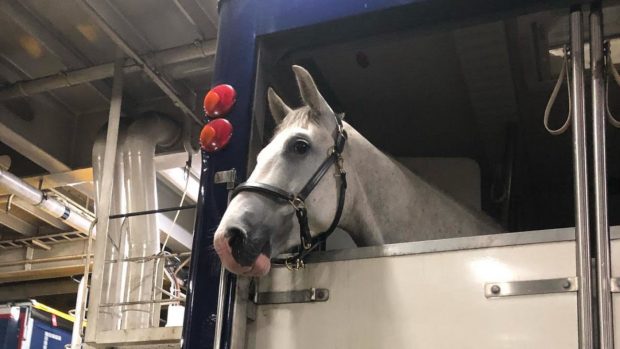Olympic rider Tina Cook is calling for riders to take extra care when travelling their horses after her eventing world team silver medallist De Novo News (“Herman”) died due to complications from shipping fever last week (13 October).
The 12-year-old developed pleuropneumonia — when infection in the lungs (pneumonia) breaks out into the space between the lungs and the ribs — after returning from Strzegom, Poland, in June.
Some fluid was drained from Herman’s chest cavity, but an inoperable abscess also developed. This was being treated with intensive antimicrobials and the horse seemed to be improving, trotting around the field and gaining weight. But the infection spread to his hocks and he was put down.
“I want to learn from this if there is anything we could have done differently,” said Tina, who bred the horse and owned him jointly with Jim Chromiak.
| Related articles |
Herman travelled home with four other horses, who are all fine. They had a break at Dutch rider Tim Lips’ yard during the journey.
“After competing my horses have half an hour in the stable to relax and have a drink before they are loaded,” said Tina. “During the journey we check them every couple of hours and offer them a drink, as well as taking suitable breaks to allow them to get their heads down and get the discharge out of their noses.”
Dr Mark Hillyer, a partner at Newmarket Equine Hospital, who had been in charge of the horse’s care since he was transferred there in late July, said: “Tina did everything right and was just unlucky. Sometimes out of 40 horses on a plane only one gets shipping fever so there is an individual susceptibility.
“The single key factor is that horses travelling need breaks where they can get their heads and necks down — they should graze or be given food or hay on the ground. The ideal would be a break every four hours.
“The infection comes when bugs at the back of the throat get down into the lungs because of the head and neck being up for a prolonged period. Cases such as this are uncommon, but they are almost invariably associated with transportation.”
Tina added: “Herman battled the infection bravely for three and a half months, but in the end it got the better of him. I’m devastated — he was a very kind horse and I always thought he’d be my four-star winner as he had all the attributes.”
H&H vet Karen Coumbe added: “Horses that travel long distances even under the best of conditions are most at risk, especially if they travel more than 500 miles. Diagnosis can be difficult in the early stages and unfortunately it is a risk associated with travelling horses.”
Ref: H&H 22 October, 2015




